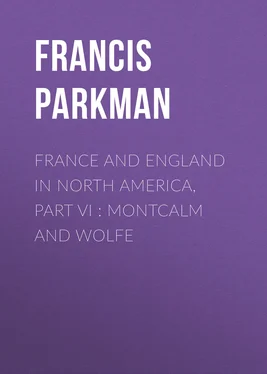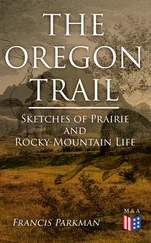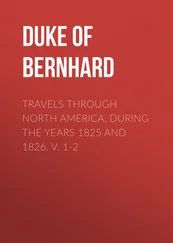Francis Parkman - France and England in North America, Part VI - Montcalm and Wolfe
Здесь есть возможность читать онлайн «Francis Parkman - France and England in North America, Part VI - Montcalm and Wolfe» — ознакомительный отрывок электронной книги совершенно бесплатно, а после прочтения отрывка купить полную версию. В некоторых случаях можно слушать аудио, скачать через торрент в формате fb2 и присутствует краткое содержание. Жанр: foreign_prose, История, foreign_edu, foreign_antique, на английском языке. Описание произведения, (предисловие) а так же отзывы посетителей доступны на портале библиотеки ЛибКат.
- Название:France and England in North America, Part VI : Montcalm and Wolfe
- Автор:
- Жанр:
- Год:неизвестен
- ISBN:нет данных
- Рейтинг книги:5 / 5. Голосов: 1
-
Избранное:Добавить в избранное
- Отзывы:
-
Ваша оценка:
- 100
- 1
- 2
- 3
- 4
- 5
France and England in North America, Part VI : Montcalm and Wolfe: краткое содержание, описание и аннотация
Предлагаем к чтению аннотацию, описание, краткое содержание или предисловие (зависит от того, что написал сам автор книги «France and England in North America, Part VI : Montcalm and Wolfe»). Если вы не нашли необходимую информацию о книге — напишите в комментариях, мы постараемся отыскать её.
France and England in North America, Part VI : Montcalm and Wolfe — читать онлайн ознакомительный отрывок
Ниже представлен текст книги, разбитый по страницам. Система сохранения места последней прочитанной страницы, позволяет с удобством читать онлайн бесплатно книгу «France and England in North America, Part VI : Montcalm and Wolfe», без необходимости каждый раз заново искать на чём Вы остановились. Поставьте закладку, и сможете в любой момент перейти на страницу, на которой закончили чтение.
Интервал:
Закладка:
In one point, however, she found general applause. She was regarded as the most military among the British colonies. This reputation was well founded, and is easily explained. More than all the rest, she lay open to attack. The long waving line of the New England border, with its lonely hamlets and scattered farms, extended from the Kennebec to beyond the Connecticut, and was everywhere vulnerable to the guns and tomahawks of the neighboring French and their savage allies. The colonies towards the south had thus far been safe from danger. New York alone was within striking distance of the Canadian war-parties. That province then consisted of a line of settlements up the Hudson and the Mohawk, and was little exposed to attack except at its northern end, which was guarded by the fortified town of Albany, with its outlying posts, and by the friendly and warlike Mohawks, whose "castles" were close at hand. Thus New England had borne the heaviest brunt of the preceding wars, not only by the forest, but also by the sea; for the French of Acadia and Cape Breton confronted her coast, and she was often at blows with them. Fighting had been a necessity with her, and she had met the emergency after a method extremely defective, but the best that circumstances would permit. Having no trained officers and no disciplined soldiers, and being too poor to maintain either, she borrowed her warriors from the workshop and the plough, and officered them with lawyers, merchants, mechanics, or farmers. To compare them with good regular troops would be folly; but they did, on the whole, better than could have been expected, and in the last war achieved the brilliant success of the capture of Louisburg. This exploit, due partly to native hardihood and partly to good luck, greatly enhanced the military repute of New England, or rather was one of the chief sources of it.
The great colony of Virginia stood in strong contrast to New England. In both the population was English; but the one was Puritan with Roundhead traditions, and the other, so far as concerned its governing class, Anglican with Cavalier traditions. In the one, every man, woman, and child could read and write; in the other, Sir William Berkeley once thanked God that there were no free schools, and no prospect of any for a century. The hope had found fruition. The lower classes of Virginia were as untaught as the warmest friend of popular ignorance could wish. New England had a native literature more than respectable under the circumstances, while Virginia had none; numerous industries, while Virginia was all agriculture, with but a single crop; a homogeneous society and a democratic spirit, while her rival was an aristocracy. Virginian society was distinctively stratified. On the lowest level were the negro slaves, nearly as numerous as all the rest together; next, the indented servants and the poor whites, of low origin, good-humored, but boisterous, and sometimes vicious; next, the small and despised class of tradesmen and mechanics; next, the farmers and lesser planters, who were mainly of good English stock, and who merged insensibly into the ruling class of the great landowners. It was these last who represented the colony and made the laws. They may be described as English country squires transplanted to a warm climate and turned slave-masters. They sustained their position by entails, and constantly undermined it by the reckless profusion which ruined them at last. Many of them were well born, with an immense pride of descent, increased by the habit of domination. Indolent and energetic by turns; rich in natural gifts and often poor in book-learning, though some, in the lack of good teaching at home, had been bred in the English universities; high-spirited, generous to a fault; keeping open house in their capacious mansions, among vast tobacco-fields and toiling negroes, and living in a rude pomp where the fashions of St. James were somewhat oddly grafted on the roughness of the plantation,—what they wanted in schooling was supplied by an education which books alone would have been impotent to give, the education which came with the possession and exercise of political power, and the sense of a position to maintain, joined to a bold spirit of independence and a patriotic attachment to the Old Dominion. They were few in number; they raced, gambled, drank, and swore; they did everything that in Puritan eyes was most reprehensible; and in the day of need they gave the United Colonies a body of statesmen and orators which had no equal on the continent. A vigorous aristocracy favors the growth of personal eminence, even in those who are not of it, but only near it.
The essential antagonism of Virginia and New England was afterwards to become, and to remain for a century, an element of the first influence in American history. Each might have learned much from the other; but neither did so till, at last, the strife of their contending principles shook the continent. Pennsylvania differed widely from both. She was a conglomerate of creeds and races,—English, Irish, Germans, Dutch, and Swedes; Quakers, Lutherans, Presbyterians, Romanists, Moravians, and a variety of nondescript sects. The Quakers prevailed in the eastern districts; quiet, industrious, virtuous, and serenely obstinate. The Germans were strongest towards the centre of the colony, and were chiefly peasants; successful farmers, but dull, ignorant, and superstitious. Towards the west were the Irish, of whom some were Celts, always quarrelling with their German neighbors, who detested them; but the greater part were Protestants of Scotch descent, from Ulster; a vigorous border population. Virginia and New England had each a strong distinctive character. Pennsylvania, with her heterogeneous population, had none but that which she owed to the sober neutral tints of Quaker existence. A more thriving colony there was not on the continent. Life, if monotonous, was smooth and contented. Trade and the arts grew. Philadelphia, next to Boston, was the largest town in British America; and was, moreover, the intellectual centre of the middle and southern colonies. Unfortunately, for her credit in the approaching war, the Quaker influence made Pennsylvania non-combatant. Politically, too, she was an anomaly; for, though utterly unfeudal in disposition and character, she was under feudal superiors in the persons of the representatives of William Penn, the original grantee.
New York had not as yet reached the relative prominence which her geographical position and inherent strength afterwards gave her. The English, joined to the Dutch, the original settlers, were the dominant population; but a half-score of other languages were spoken in the province, the chief among them being that of the Huguenot French in the southern parts, and that of the Germans on the Mohawk. In religion, the province was divided between the Anglican Church, with government support and popular dislike, and numerous dissenting sects, chiefly Lutherans, Independents, Presbyterians, and members of the Dutch Reformed Church. The little city of New York, like its great successor, was the most cosmopolitan place on the continent, and probably the gayest. It had, in abundance, balls, concerts, theatricals, and evening clubs, with plentiful dances and other amusements for the poorer classes. Thither in the winter months came the great hereditary proprietors on the Hudson; for the old Dutch feudality still held its own, and the manors of Van Renselaer, Cortland, and Livingston, with their seigniorial privileges, and the great estates and numerous tenantry of the Schuylers and other leading families, formed the basis of an aristocracy, some of whose members had done good service to the province, and were destined to do more. Pennsylvania was feudal in form, and not in spirit; Virginia in spirit, and not in form; New England in neither; and New York largely in both. This social crystallization had, it is true, many opponents. In politics, as in religion, there were sharp antagonisms and frequent quarrels. They centred in the city; for in the well-stocked dwellings of the Dutch farmers along the Hudson there reigned a tranquil and prosperous routine; and the Dutch border town of Albany had not its like in America for unruffled conservatism and quaint picturesqueness.
Читать дальшеИнтервал:
Закладка:
Похожие книги на «France and England in North America, Part VI : Montcalm and Wolfe»
Представляем Вашему вниманию похожие книги на «France and England in North America, Part VI : Montcalm and Wolfe» списком для выбора. Мы отобрали схожую по названию и смыслу литературу в надежде предоставить читателям больше вариантов отыскать новые, интересные, ещё непрочитанные произведения.
Обсуждение, отзывы о книге «France and England in North America, Part VI : Montcalm and Wolfe» и просто собственные мнения читателей. Оставьте ваши комментарии, напишите, что Вы думаете о произведении, его смысле или главных героях. Укажите что конкретно понравилось, а что нет, и почему Вы так считаете.












